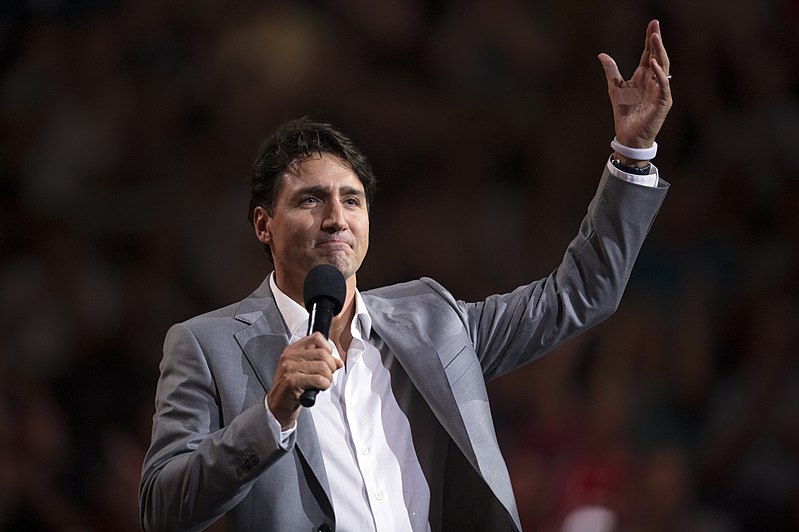Expert: Justin Trudeau’s French isn’t bad; Quebecers just don’t think he belongs

BINGHAMTON, N.Y.—Quebec’s criticism of Justin Trudeau’s French serves to position him as an “outsider” to Quebecois identity, according to a professor at Binghamton University, State University of New York.
Yulia Bosworth, assistant professor of French linguistics at Binghamton, studied Quebec’s “obsession” with Justin Trudeau’s French, which pundits and scholars perceive as terrible and construe as a major failure on his part, both personal and professional. She determined that Quebec’s criticism reflects its view of Canada’s current prime minister as an outsider and its denial of him as a francophone, or someone who speaks French. Bosworth determined that Quebec’s language attitudes and ideologies are dominated by linguistic purism and French monolingualism.
“This collective stance denying Justin Trudeau the status of a francophone speaks to the larger issue of what it takes to “belong” in today’s Quebec,” said Bosworth. “It is not at all surprising that being a francophone serves as the basis for membership in Quebec’s collective identity. What is controversial is the way that Quebec appears to construe what it means to be a francophone, which seems to be strongly biased in favor of monolingual French speakers of French-Canadian ancestry. This conceptualization of identity is likely to find itself at odds with Quebec’s current and projected demographic situation, including the trend of increasing bilingualism, and its commitment to a pluralistic society that prizes diversity, by othering those who do not conform to this identity, which potentially describes a fairly large segment of Quebec’s population, in particular, in urban settings.”
Bosworth added that language is frequently used to discriminate against others.
“Language can be and often is used as a proxy for fostering negative judgments or making negative comments about an individual or a group,” she said. “It is not okay to do so based on gender, race, sexual identity, etc., but criticizing the way someone speaks is not perceived in the same way. This is not a new idea, but it is crucial to our understanding of what I demonstrate to be Quebec’s near-obsession with Trudeau’s ‘bad’ French. Namely, language is used here as a way to criticize Trudeau as a politician and as an individual, with an underlying objective to position him as an outsider in Quebec, despite the fact that Trudeau himself strongly identifies with French and with Quebec, as evidenced in his personal interviews and his recent autobiography.”
Bosworth investigated Quebec’s fixation with the “bad” French of Trudeau and what it means in the larger context of identity, linguistic insecurity and Canadian bilingualism. Quebec’s “obsession” with Trudeau’s linguistic transgressions is demonstrated in an analysis of the harsh commentary generated in Quebec’s mainstream press during the 2015 Canadian Federal Election. The intensely negative judgment, fostered and propagated by Quebec’s educated elites, is shown to be rooted in the interplay of language ideologies and a complex sociolinguistic history of Quebec, which features the linguistic legacy of Trudeau’s famous father, Pierre Elliott Trudeau. Bosworth said that Quebec’s negative view of his father’s politics influences the way they perceive Trudeau.
“In fact, it is not that the language makes them view him as an outsider, but that they use his French as a means to portray him as such,” she said, “For better or worse, in Quebec, Justin Trudeau is inextricably linked to the legacy of his father, Pierre-Elliot Trudeau, whose tenure left a bitter taste in the mouths of Quebecers, to say the least. Curiously, his Quebec-born father was criticized for not speaking like a Quebecer, because he made a choice to align his French with the so-called International French spoken by educated Parisian elites. Justin Trudeau’s French, on the other hand, is very much Quebec French, but he does not get credit for the aspects of it that are viewed positively by Quebecers at large and is acrimoniously criticized for those that are viewed negatively, although widely present in the speech of many, if not most, Quebecers.”
Bosworth analyzed the roots of this fixation and extreme negativity, explaining and “debunking” this collective behavior. She suggested that the criticism is partly conditioned by Quebec’s long-standing adherence to linguistic purism, which stems from its historical struggle against widespread negative perceptions of Quebec French.
“The negative judgments are also conditioned by the long-standing tradition of linguistic purism and normativism, which tells speakers that there is only one “correct” way to use the French language, that aligned with the usage of educated Parisian elites,” she said. “Any deviation from this usage constitutes a violation, a deviation, incorrect usage. I show that when Trudeau is being accused of speaking French badly, it is either due to the use of anglicisms, or to the use of language – words, expressions, sentence structure and pronunciation – that characterize everyday use of an average Quebecer in a familiar setting.”
Although Quebec’s criticism of Trudeau’s French was the most severe in 2015, Bosworth said the topic is still relevant today.
“On a larger scale, this forces us to draw a parallel between Quebec’s denial of the status of francophone to Justin Trudeau and that of other Quebec’s bilinguals, representing other French-speaking minorities in Canada, as well as immigrants from other French-speaking regions, strongly favored by Quebec’s immigration practices, where French is spoken differently and carries with it cultural connotations that differ from those internalized by Quebecers of French-Canadian ancestry,” said Bosworth. “Very recently, a discussion of Justin Trudeau’s ‘bad’ French has made its way back into the media, albeit on a much more limited basis, and what is interesting about it this time around is that we see testimonies from other young English-French bilinguals representing French-speaking communities in Alberta, Manitoba, Ontario, who state that they very much identify with Justin Trudeau’s French and its negative perception by Quebecers, because it strays from what Quebec views as ‘correct,’ ‘good,’ authentic French.”
Bosworth plans to continue studying language attitudes and perceptions in Quebec and their connection to how Quebecers collectively construe identity.
